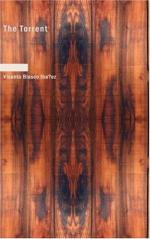With bowed head, crushed by the realization of the scene that had followed his flight, Rafael did not notice where they were going. But soon he became conscious of the perfume of flowers. They were crossing a garden; and as he looked up he saw the figure of Valencia’s conqueror on his sinewy charger glistening in the sun.
They walked on. The old man began in wailing accents to describe the situation which the Brull House was facing. That money, which perhaps Rafael still had in his pocket—more than thirty thousand pesetas—represented the final desperate efforts of his mother to rescue the family fortune, which had been endangered by don Ramon’s prodigal habits. The money was his, and don Andres had nothing to say in that regard. Rafael was at liberty to squander it, scatter it to the four winds of heaven; but don Andres wasn’t talking to a child, he was talking to a man with a heart: so he begged him, as his childhood preceptor, as his oldest friend, to consider the sacrifices his mother had been making—the privations she had imposed upon herself, going without new clothes, quarreling with her help over a centimo, despite all her airs as a grand lady, depriving herself of all the dainties and comforts that are so pleasant to old age—all that her son, her senor hijo, might waste it in gay living on a woman! Thirty thousand! And don Andres mentioned the sum with bated breath! It had taken so much trouble to hoard it! Come, man! The sight of such things was enough to make a fellow cry like a baby!...
And suppose his father, don Ramon, were to rise from the grave? Suppose he could see how his Rafael were destroying at a single stroke what it had cost him so many years to build up, just because of a woman!...
They were now crossing a bridge. Below, against the background of white gravel in the river-bed the red and blue uniforms of a group of soldiers could be seen; and the drums were beating, sounding in the distance like the humming of a huge bee-hive—worthy accompaniment, Rafael reflected, to the old man’s evocation of the youth’s father. Rafael thought he could almost see in front of him the massive body, the flourishing mustache, the proud, arrogant brow of don Ramon, a born fighter, an adventurer destined from the cradle to lead men and impose his will upon inferiors.
What would that heroic master of men have said of this? Don Ramon would give a lot of money to a woman—granted—but he wouldn’t have swapped all the beauties on earth put together for a single vote!
But his son, the boy on whom he had grounded his fondest hopes—the redeemer destined to raise the House of Brull to its loftiest glory—the future “personage” in Madrid, the fondled heir-apparent, who had found his pathway already cleared for him at birth—was throwing all his father’s labors through the window, the way you toss overboard something it has cost you nothing to earn! It




